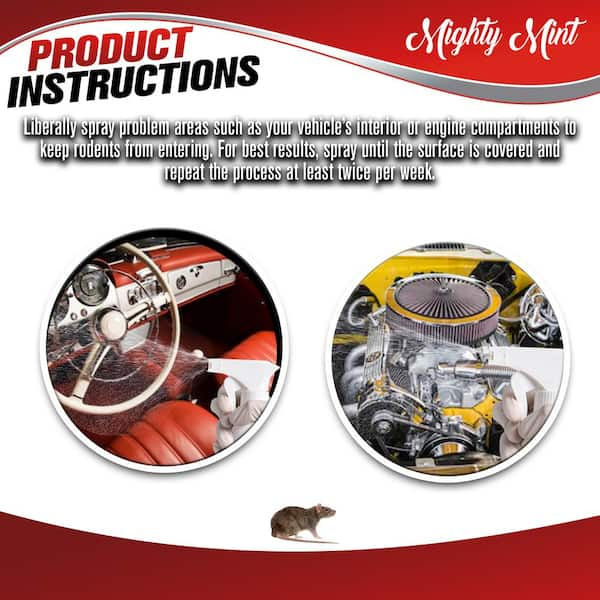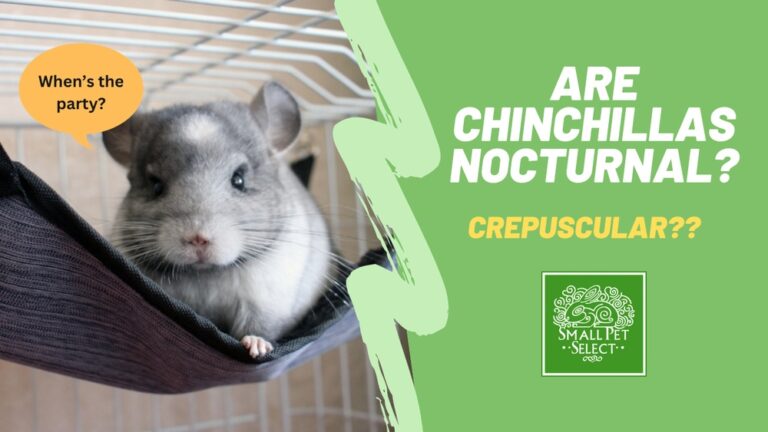Rodent Repellent Spray For Vehicle Engines And Interiors: Ultimate Protection Guide
Have you ever found your car won’t start because rodents made a cozy home inside the engine or chewed through wires? It’s frustrating, costly, and can happen without warning.
What if you could protect your vehicle easily, without messy traps or expensive repairs? A rodent repellent spray designed specifically for vehicle engines and interiors might be the simple solution you need. Keep reading to discover how this spray works, why it’s effective, and how it can save you time and money while keeping your ride safe from unwanted furry guests.
Why Rodents Target Vehicles
Rodents often choose vehicles as their nesting and hiding spots. Engines and interiors provide warmth and shelter, especially during cold seasons. The tight spaces inside vehicles protect them from predators and bad weather. Understanding why rodents target vehicles helps in preventing damage and costly repairs.
Common Rodent Species
Several rodent types cause problems in vehicles. Mice and rats are the most common offenders. They are small, curious, and can squeeze into tiny spaces. Squirrels sometimes take shelter in engines too. These rodents chew wires, insulation, and plastic parts. Their nesting can block air filters and cause mechanical issues.
Attraction Factors In Engines And Interiors
Vehicle engines offer warmth from recent use. Rodents seek this heat to stay comfortable. The engine bay contains soft materials for nests. Wires and cables attract rodents because of their texture. Inside the car, seats and carpets provide cozy places to hide. Food crumbs left in the vehicle also lure rodents. This combination makes vehicles an ideal rodent spot.

Credit: www.homedepot.com
Damage Caused By Rodents
Rodents cause serious damage to vehicles. They often seek shelter in engines and interiors. Their chewing can lead to costly repairs and safety problems. Understanding the types of damage helps protect your car effectively.
Engine Wiring Hazards
Rodents chew on engine wires and cables. This causes electrical shorts and engine failure. Damaged wiring can stop your car from starting. It may also lead to dangerous fires. Repairing wiring is expensive and time-consuming.
Interior Material Damage
Rodents gnaw on seats, carpets, and insulation. They leave holes and tears in upholstery. Their droppings cause unpleasant smells and stains. Replacing interior parts raises repair bills. It also lowers the vehicle’s value.
Safety Risks And Repair Costs
Rodent damage creates safety risks while driving. Electrical faults can cause sudden breakdowns. Damaged parts may affect airbags and brakes. Repair costs add up quickly. Preventing damage saves money and stress.
Types Of Rodent Repellent Sprays
Rodent repellent sprays come in different types to protect vehicle engines and interiors. Each type works in a unique way to keep rodents away. Choosing the right spray depends on your needs and preferences. Understanding these types helps in picking the best option for your car.
Natural Vs Chemical Sprays
Natural sprays use plant-based ingredients like peppermint or citronella. They smell strong to rodents but are safe for people and pets. Chemical sprays contain synthetic ingredients designed to repel rodents effectively. These can be stronger but may have a stronger odor and need careful use. Natural sprays suit those preferring eco-friendly options. Chemical sprays often provide longer-lasting protection.
Scent-based Repellents
Scent-based repellents focus on smells that rodents dislike. These sprays release odors that irritate rodents’ senses. Common scents include garlic, mint, and eucalyptus. They work by making the vehicle environment unpleasant for rodents. Scent sprays are easy to apply and can be refreshed regularly. They avoid harming animals but keep rodents at bay.
Ultrasonic And Combined Solutions
Ultrasonic repellents use high-frequency sounds to scare rodents. These sounds are inaudible to humans but disrupt rodent behavior. Some sprays combine scents with ultrasonic devices for better results. Combined solutions offer a two-way defense against rodents. They reduce the chance of rodents returning to your vehicle. Such options suit those seeking multiple protections in one product.
Choosing The Right Repellent Spray
Choosing the right rodent repellent spray for your vehicle can prevent costly damage. Different sprays offer varying levels of protection and features. Picking the right one ensures safety and long-lasting results. Consider key factors before making your choice.
Effectiveness And Longevity
Choose a spray that effectively deters rodents from engines and interiors. Check for products tested against common pests like mice and rats. Look for sprays with long-lasting effects to reduce frequent applications. A good repellent maintains its strength despite heat and moisture. This helps keep rodents away for weeks or months.
Safety For Vehicle Components
Ensure the spray is safe for your engine parts and interior materials. Avoid harsh chemicals that can damage plastic, rubber, or metal parts. Select non-corrosive formulas to protect wires and hoses. A safe spray will not leave sticky or oily residues. This keeps your vehicle clean and in good condition.
Environmental And Health Considerations
Pick sprays made from natural or non-toxic ingredients to protect health. Avoid strong chemical smells that can irritate skin or lungs. Choose eco-friendly options that do not harm pets or wildlife. Proper ventilation after application reduces any discomfort. Safe sprays help keep your family and environment healthy.
Application Techniques For Maximum Protection
Applying rodent repellent spray correctly ensures the best protection for your vehicle. It helps keep rodents away from engines and interiors. Proper application techniques increase the spray’s effectiveness and longevity. Follow these steps for maximum protection.
Preparing Vehicle Surfaces
Clean all areas before spraying. Remove dirt, grease, and dust. Use a dry cloth to wipe surfaces. Ensure the engine is cool to avoid damage. Dry surfaces help the spray stick better. Focus on wires, hoses, and vents where rodents hide.
Spray Coverage Tips
Spray evenly across all target areas. Hold the nozzle close to surfaces. Avoid spraying too much in one spot. Use short bursts to cover wires and crevices. Spray inside the engine bay and under the dashboard. Make sure to reach hidden corners and gaps.
Frequency And Timing Of Applications
Apply the spray every 2 to 4 weeks. More frequent use may be needed in rodent-heavy areas. Spray after rain or washing the vehicle. Best to apply in the evening when rodents are most active. Regular use maintains a strong barrier against pests.
Additional Preventive Measures
Rodent repellent spray helps protect your vehicle, but other steps improve safety. Using extra methods keeps rodents away from engines and interiors. These steps add layers of defense and reduce damage risks. Here are some useful ways to stop rodents from nesting in your vehicle.
Physical Barriers And Traps
Physical barriers block rodents from entering your vehicle. Wire mesh or metal screens cover vents and openings. Rodents cannot chew through these strong materials. Traps catch rodents before they cause harm. Place traps near parking spots or garage corners. Check traps often to keep them effective.
Regular Maintenance Routines
Clean your vehicle regularly to remove food and debris. Rodents are attracted to smells and crumbs. Check engine compartments for signs of nests or droppings. Tighten loose parts and seal gaps where rodents might hide. A well-maintained vehicle is less inviting to pests.
Parking Strategies To Deter Rodents
Park your vehicle in open, well-lit areas. Rodents avoid bright places and open spaces. Avoid parking near trash or woodpiles that attract rodents. Use a garage if possible, and keep it clean. Moving your vehicle regularly also disrupts rodent activity.
Signs Of Rodent Infestation
Rodents can cause serious damage to vehicles by nesting in engines and interiors. Early detection is crucial to prevent costly repairs. Recognizing signs of rodent infestation helps protect your car from harm.
Visual Indicators
Look for droppings around the engine or inside the cabin. Chewed wires and torn insulation are clear signs. Nests made from leaves or paper may appear near vents or under the hood. Rodent tracks or grease marks on cables also indicate their presence.
Unusual Noises And Smells
Scratching or scurrying sounds inside the engine or dashboard signal rodents. These noises usually happen at night or early morning. A strong urine or musty odor inside the car can mean rodents are nearby. Foul smells often come from hidden nests or waste.
Performance Issues In Engines
Rodents chewing wires cause electrical problems and engine failure. Your car may not start or stall unexpectedly. Warning lights on the dashboard can turn on without a clear reason. Reduced engine power or strange smells while driving can also appear.

Credit: www.amazon.com
Troubleshooting Common Problems
Rodent repellent sprays help protect vehicle engines and interiors from damage. Sometimes, these sprays do not work as expected. Troubleshooting common problems can save time and reduce damage. Understanding why repellents fail and knowing the next steps can keep your vehicle safe.
When Repellents Fail
Repellent sprays may lose effectiveness over time. Strong odors fade, and rodents may return. Some rodents get used to certain smells. Applying spray too lightly or unevenly can reduce protection. Dirt and moisture also weaken the spray’s power. Reapply regularly and cover all areas well.
Professional Pest Control Options
When sprays do not work, professional help is useful. Experts use stronger, safe treatments for vehicles. They inspect hidden spots where rodents hide. Professionals can also advise on prevention steps. Calling a pest control service can stop rodent problems fast.
Repairing Rodent Damage
Rodents chew wires, hoses, and seats. Damaged parts affect vehicle safety and function. Check for bite marks and loose wires often. Replace any damaged cables and parts quickly. Clean inside the engine and cabin to remove smells. Early repairs prevent costly vehicle problems later.

Credit: www.amazon.com
How Smart Pets Lover Can Help You with Rodent Repellent Spray For Vehicle Engines And Interiors
Practical Learning: Protecting Your Vehicle from Rodents with Confidence
Understanding why rodents target vehicles and recognizing the signs of infestation are the first steps toward effective prevention. As pet lovers who care deeply about all creatures, it’s important to approach rodent repellent spray for vehicle engines and interiors with both empathy and knowledge. Applying the right repellent spray using proper techniques not only safeguards your vehicle from costly damage but also aligns with responsible pet care values—after all, a safe environment benefits everyone.
Consider this a hands-on opportunity to sharpen your observation skills and troubleshoot common problems early. Keeping a regular eye out for chew marks or nesting materials can guide timely application and additional preventive measures. At Smart Pets Lover, we believe learning through experience and sharing insights strengthens the bond between pet parents and their surroundings.
- Monitor your vehicle regularly for signs of rodent activity
- Practice careful application of repellent sprays following guidelines
- Combine sprays with preventive habits like proper storage and cleanliness
For more detailed advice, you’re welcome to reach out to pet care communities or experts who understand the emotional connection we share with all animals—large or small. Together, we create safer spaces where every wag, purr, and chirp tells a story worth protecting.
Frequently Asked Questions
What Is Rodent Repellent Spray For Vehicle Engines?
Rodent repellent spray deters mice and rats from nesting in engines. It uses natural or chemical ingredients to keep rodents away. This spray protects wiring and interiors from damage caused by chewing and nesting.
How Does Rodent Repellent Spray Protect Vehicle Interiors?
The spray creates an unpleasant smell for rodents, discouraging them. It prevents rodents from chewing seats, wires, and insulation inside vehicles. Regular use keeps interiors safe and rodent-free.
Is Rodent Repellent Spray Safe For My Car’s Engine?
Yes, most sprays are designed to be non-toxic and safe for vehicles. They do not harm engine components or electrical systems. Always follow the manufacturer’s instructions for safe application.
How Often Should I Apply Rodent Repellent Spray?
Apply the spray every few weeks or after heavy rain. Regular reapplication ensures continuous protection against rodent infestations. Check product guidelines for specific frequency recommendations.
Conclusion
Rodent repellent spray helps protect your vehicle’s engine and interior. It keeps wires and parts safe from chewing damage. Using it regularly can save you from costly repairs. The spray smells bad to rodents but is safe for your car.
Easy to apply and effective, it offers peace of mind. Protect your vehicle and avoid unexpected problems. A small step for big savings and less stress. Try it to keep your car rodent-free. Simple, smart care for your vehicle’s health.





